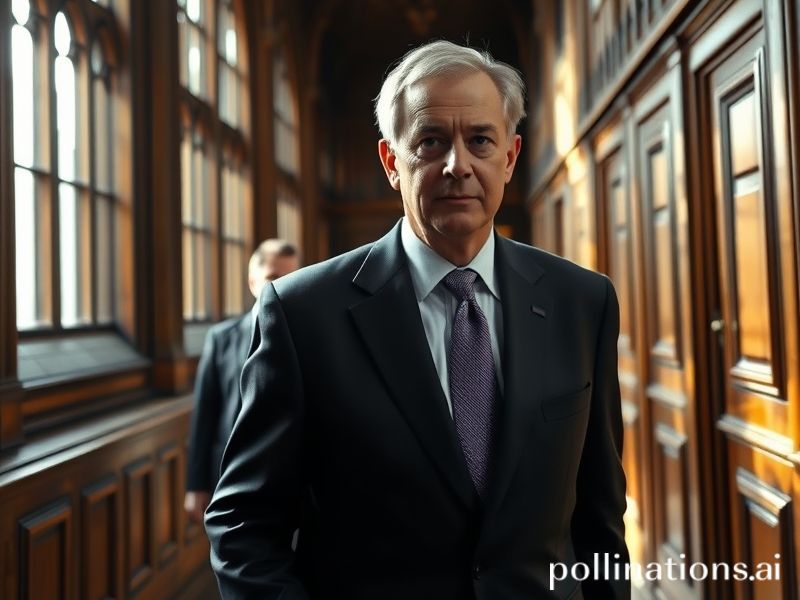Tony Blair, Global Centrist Vampire: How One Man Keeps Monetizing the Post-Democratic Hangover
Tony Blair Rides Again: The Eternal Comeback Kid of the Post-Liberal Order
An International Post-Mortem on the Man Who Refuses to Lie Down
By the time you finish this sentence, Tony Blair will have appeared on a panel in Singapore, launched a commission in Abuja, and offered “strategic advice” to a clutch of nervous Gulf monarchs who still haven’t worked out what “the vision thing” means. Twenty-five years after his first electoral triumph, the former British prime minister remains the political equivalent of glitter—once it’s on you, no amount of scrubbing removes it. The rest of us merely rearrange the sparkle.
From Washington to Warsaw, Blair’s brand of centrist boosterism is treated like a vintage Bordeaux: expensive, over-oaked, and inexplicably popular with people who claim to know better. In Brussels, officials still quote his 2005 EU presidency pitch as though it were a lost gospel. In Kyiv, his name surfaces whenever someone needs a “senior statesman” who won’t accidentally annex half the Donbas. Meanwhile, in Beijing, Communist cadres study his triangulation techniques with the same intensity they once reserved for the Little Red Book—proof that irony is not just undead but franchised.
The world has changed dramatically since Blair’s pomp—Brexit, Trump, TikTok, the triumphant return of polio—yet Blair glides above the carnage like a well-tailored drone. His Global Institute pumps out white papers on everything from AI ethics to “progressive governance” at the speed of a Netflix algorithm. The titles are so bland they achieve a kind of anti-satire: “Delivering Tomorrow’s Change Today, Responsibly.” One imagines exhausted interns locked in a Mayfair basement, forbidden to leave until every noun has been focus-grouped into submission.
Critics, of course, insist that Blair’s real legacy is less white paper than blood-red ledger: two wars, a million dead, and a Middle East re-engineered for maximum instability. But that is a parochial view. Seen from the boardrooms of Davos, Blair’s true innovation was privatizing geopolitics itself. While lesser leaders wasted time on tedious accountability, he pioneered the lucrative art of strategic counsel—advising both Kazakhstan’s ruling dynasty and Saudi Arabia’s sovereign wealth fund without, apparently, suffering cognitive dissonance. One day he’s preaching “open societies”; the next, he’s helping an autocrat rebrand a human-rights festival. It’s a hustle so audacious it deserves its own TED Talk: “How to Monetize Moral Flexibility in 12 Easy Installments.”
Developing nations watch this perpetual motion machine with a mixture of envy and dread. African finance ministers whisper that a Blair endorsement can unlock World Bank loans faster than you can say “structural adjustment.” Latin American presidents, fresh from their own experiments with neoliberal necromancy, view him as a cautionary tale wrapped in a Mont Blanc suit. Even the Scandinavians—those high-trust Lutherans who blush at queue-jumping—have quietly retained his firm to “optimize” their digital ID rollout. No one wants to be caught using yesterday’s euphemisms.
And then there is Britain, the aging patient zero of Blairism, where the mere mention of his name triggers a Pavlovian culture war. The left reviles him as a war criminal who sold socialism for a seat on Murdoch’s yacht. The right despises him as the cosmopolitan ghost who let in “millions” of immigrants (actual figure: complicated) while simultaneously exporting British jobs to the EU (also complicated). Both agree on only one point: he is inexplicably tan for a man who claims to live on airplanes. Perhaps radioactive self-belief emits UV rays.
Globally, Blair’s enduring relevance reveals an uncomfortable truth: in the absence of coherent ideology, charisma plus PowerPoint equals immortality. As liberal democracy limps through its late-stage imperial hangover, voters don’t want accountability; they want a reassuring baritone promising “delivery.” Blair supplies the voice-over, the Gulf states supply the speaking fees, and the rest of us supply the amnesia. If that sounds cynical, remember: he’s the one still getting paid.
So here we are, orbiting the Blair singularity, watching nations outsource their sovereignty to a man who once rebranded Labour as “New” and then—like any good consultant—moved on before the warranty expired. History may judge him harshly, but history doesn’t have a speaking slot at the Qatar Economic Forum. Until the universe develops antibodies for messianic centrism, Tony Blair will remain the undead emcee of our collective fever dream—mic in hand, teeth gleaming, ready to announce the next act whether we bought tickets or not.







